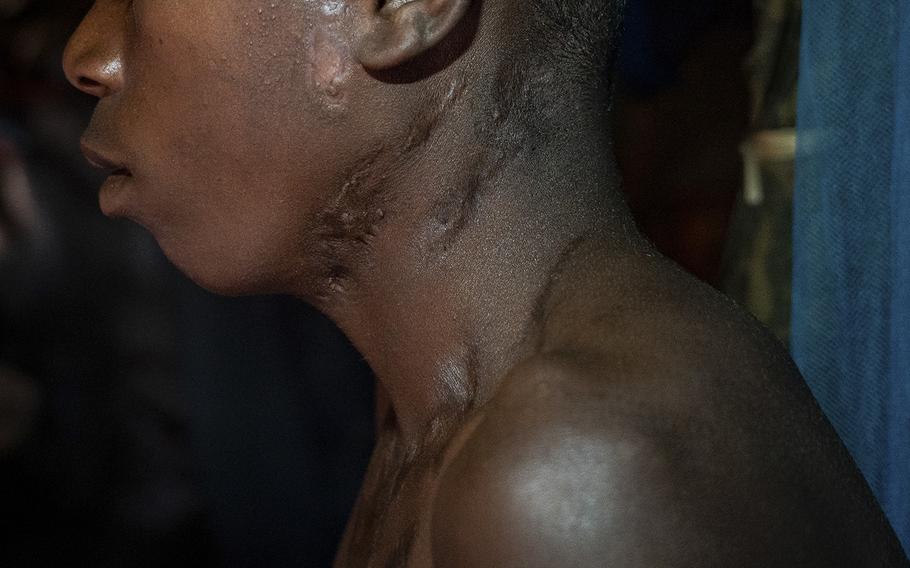
R.A. shows the scars around his neck and chest left by his Islamic State captors in a village near Pemba, Mozambique, on Sept. 2, 2022. (Salwan Georges/Washington Post )
PEMBA, Mozambique - The boy's scars streak under his ears and circle his neck, dark razor marks left by the Islamic State militants who overran his village. The fighters tried to recruit him. When he refused, the torture began. He was 13.
But the boy's deepest trauma surfaces when he talks about what happened to his uncle. His eyes dim and his voice gets low, almost disappearing in the breeze.
"They beheaded my uncle that day, along with others," recalled R.A., who is now 16 and living in a refugee camp. "He was begging for help, but I could do nothing. I was too scared. I could hear the machete striking him. I could hear his screams."
In northern Mozambique, one of the Islamic State's newest branches is fueling a brutal insurgency that has raged out of sight in small villages and remote forests since late 2017. Women are kidnapped and kept as sex slaves, boys are forced to become child soldiers, beheadings are weapons of terror. The conflict has claimed about 4,000 lives; nearly 1 million people have fled their homes, separating countless families.
Victims shared their stories with The Washington Post on the condition that they be identified only by their first names, and, in R.A.'s case, by his initials, because his first name is uncommon. They still live in fear of the militants.
The violence and instability also threaten one of the world's most lucrative deposits of natural gas. As Russia's war in Ukraine drives up gas prices, fueling fears of scarcity across Europe, northern Mozambique's reserves of liquefied natural gas, or LNG - the third largest in Africa - are viewed as vital.
Even before the Russian invasion of Ukraine in February, the U.S. government approved nearly $6 billion in loans and risk insurance to help get Mozambique's nascent natural gas industry off the ground. American and European oil and gas companies, including ExxonMobil and French giant TotalEnergies, have multibillion-dollar projects in the resource-rich province of Cabo Delgado, in the country's far north. But the five-year-old Islamist insurgency there has halted most production.
The U.S. and European governments are trying to help Mozambican forces fight the militants - and get the gas flowing.
"They have completely stopped LNG operations from moving forward," said a U.S. Embassy official in the capital, Maputo, speaking on the condition of anonymity to discuss the situation freely. "There certainly is a new urgency for LNG with Ukraine."
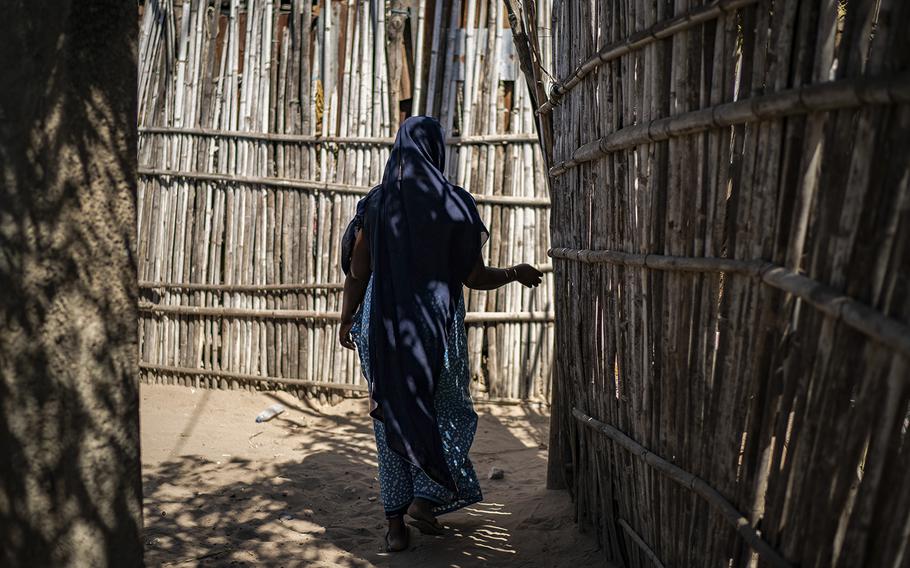
Ulenca, 22, makes her way home in Pemba, Mozambique, on Sept. 1, 2022. (Salwan Georges/Washington Post )
Africa has become a new frontier for Islamist militant groups in recent years, with al-Qaeda and the Islamic State spreading rapidly across the continent. Though the groups still claim global aspirations, they are engaged here in local conflicts, capitalizing on weak governments and exploiting old grievances and inequities.
Last year, the State Department designated the Islamic State of Mozambique, or ISIS-Mozambique, as a foreign terrorist organization, though the group is believed to have fewer than 500 fighters. The United States also imposed sanctions on the group's leader, Abu Yasir Hassan, though it's unclear whether he is still in charge, or is even still alive.
The Pentagon's Africa Command is training Mozambican troops to improve their counterterrorism capabilities. The European Union is spending $89 million to train and equip 11 rapid-reaction units of the Mozambican army, in part because Portuguese and Italian oil companies also operate here alongside TotalEnergies.
The militants "are in a key area, so their influence has been quite large," the U.S. official said. "In order to create terror, you don't need that many people."
ISIS-Mozambique has always been small in relative terms, but the weakness of the Mozambican armed forces allowed the group to make rapid gains in recent years, seizing towns and cities, and exacting a terrible toll on communities across the north.
R.A. said the militants beheaded his uncle and other men in his village for not disclosing the positions of Mozambican forces. After the executions, two fighters beat him with the butts of their rifles as he sat in the sun, hands tied. When he refused to take up arms for them, he said, they brought out the razor blade.
"I was tortured for two hours," recalled R.A., who is tall and slim, and wore cutoff blue jean shorts and red slippers. As he spoke, his words slowed and his eyes drifted to the ground.
R.A.'s ordeal could not be independently verified, but similar claims were made by other victims interviewed by The Post in northern Mozambique last month, and corroborated by accounts from aid workers and community activists. The Post also reviewed graphic social media footage showing the aftermath of militant attacks in the region.
When the extremists tired of torturing him, R.A. said, he was forced to walk several hours to their jungle base, the blood still running down his chest.
The insurgency began in October 2017, fueled by a complex and combustible mix of poverty, inequality and Islamist radicalization. In Cabo Delgado, residents have long felt politically and economically isolated, even after natural gas and minerals were discovered here.
"This is first and foremost a rebellion of local youth who have been frustrated and marginalized, the fishermen and local miners who saw their businesses extinguished," said Dino Mahtani, former deputy Africa director for the International Crisis Group (ICG).
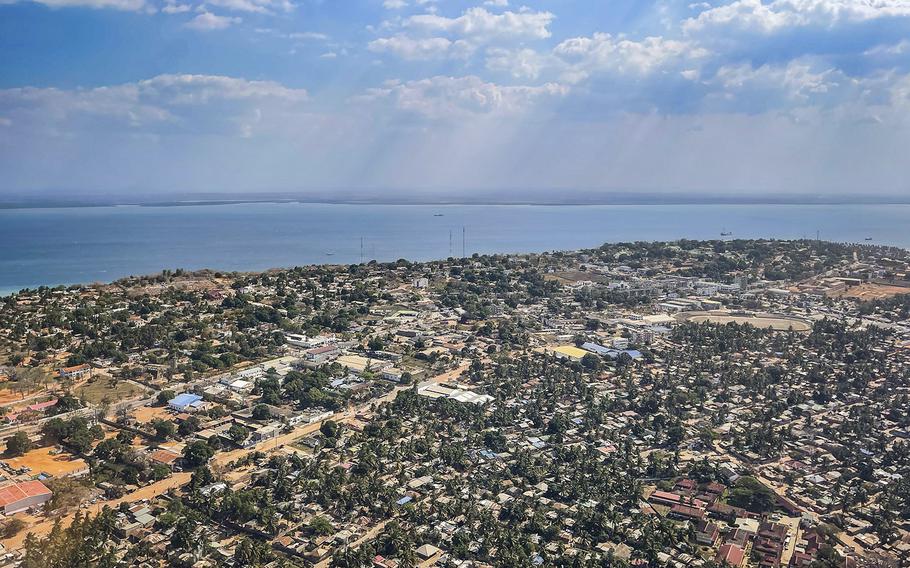
Pemba is the capital of the northern Mozambican province of Cabo Delgado, where an Islamist insurgency has raged since late 2017. (Salwan Georges/Washington Post )
The economic exclusion dovetailed with growing Islamist extremism in the region.
"The war came from outside," said Sheikh Nasrullahi Dula, a leader of Mozambique's Muslim community, pointing to ultraconservative clerics from Kenya and Tanzania who started madrassas here in 2010 that began to radicalize young men in Muslim-majority Cabo Delgado. "They taught the opposite of what we preached. They taught that women were nothing and the government is not to be respected."
Militant local youths began to denounce more moderate religious leaders like Dula and pushed to ban alcohol and stop women from working. Their resentment grew as elites drawn from President Filipe Nyusi's Makonde ethnic group secured business deals in the province at the expense of the Mwani and Makua ethnic minorities, the ICG said in a report last year. The ethnic tensions have simmered since the Portuguese colonial era.
Local discontent deepened with the discovery of ruby and gas deposits. The government cleared many residents off their lands to make room for foreign concessions. Prices for rents and commodities soared. The extremists "found a very fertile place to recruit unemployed, frustrated youth," said João Feijó, a Mozambican sociologist who has studied the roots of the war.
In early 2017, the government sent police to eject thousands of artisanal miners from a commercial ruby mine. The police "burned houses, they raped women and men. They beat, they tortured," Feijó said. "Suddenly, they broke all these possibilities for the youth to get some earnings. But they didn't provide an alternative."
The Mozambican president's office, the Defense Ministry, Cabo Delgado's governor and other local officials did not respond to The Post's requests for comment or interviews.
When the uprising began months later, some of the first militant recruits were miners, according to Western diplomats and analysts.
By 2018, the Islamic State had embraced the militants, who now counted Tanzanians and other foreigners among their ranks, including defectors from al-Qaeda affiliates in East Africa, analysts said. Some Tanzanians are now leaders while the lower-level militants are largely Mozambicans, primarily Mwani and Makua youths.
It remains unclear how strong ISIS-Mozambique's ties are to the central Islamic State leadership in Syria and Iraq. The militants here carry the trademark black Islamic State flag and pledged allegiance to the terrorist network two years ago. On social media and in its online magazine, Islamic State leaders have lauded recent attacks in Mozambique, including some targeting Christians.
"There is communication going back and forth," the U.S. Embassy official said. "It is probably a more independent ISIS branch than others, but the links are real enough for us to declare it."
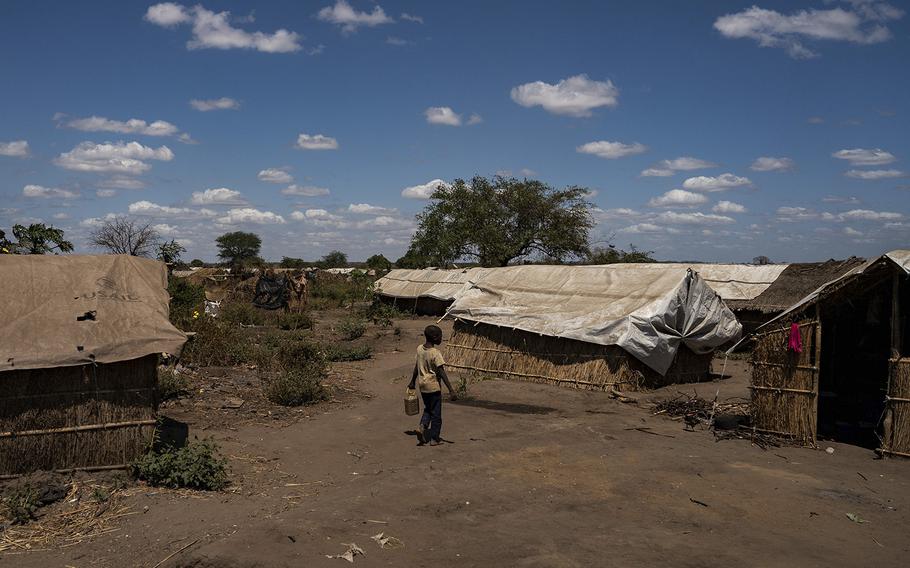
A refugee boy walks through tents in a village near Pemba, Mozambique, on Sept. 2, 2022. (Salwan Georges/Washington Post )
In 2019, desperate to stem the insurgency, the Mozambican government hired mercenaries from Russia's Wagner Group, which is run by an oligarch with close ties to Russian President Vladimir Putin. But the infamous private military, which is now fighting in Ukraine and a slew of other African countries, departed several months later after suffering heavy casualties, according to Western diplomats and analysts.
Mozambique then turned to Rwanda and several southern African nations, whose forces entered the conflict last year. Regional leaders fear the violence could spill into their countries and further destabilize the coast of East Africa, which is already plagued by other terrorist groups.
The joint African forces - better trained and equipped than their Mozambican counterparts - have pushed ISIS-Mozambique out of the northern cities and towns they seized last year, including Palma, the epicenter of natural gas exploration. But the insurgents have expanded to new areas, including the province's southern districts near the regional capital, Pemba, and have even conducted raids into Tanzania.
They use guerrilla tactics, hiding within local communities or in the vast forests of Cabo Delgado, an area the size of South Carolina. In small groups, numbering no more than 10 fighters, they have staged a steady stream of hit-and-run attacks since May, when Islamic State leaders declared ISIS-Mozambique to be an autonomous branch operating in its own "province."
"Right now, it is absolutely impossible for them to control a big city, populations, or even seize a little bit of land for more than 24 hours," said Brig. Gen. Nuno Lemos Pires, until recently the European Union's mission force commander in charge of training Mozambican army units. "That said, it doesn't mean that things are under control."
On a visit to Mozambique last month, the European Union's foreign policy chief, Josep Borrell, announced $15 million in new funding for the joint African forces, just days after Islamist militants beheaded six civilians and killed an Italian nun in Nampula province.
Borrell said the attacks are "a stark reminder that the fight against terrorism is not over and that, unhappily, it is spreading."
The violence has prevented aid organizations from assisting the tens of thousands of people who have fled their homes in recent months. Nearly 60 percent of the displaced are children. Scores of health clinics and schools are closed or destroyed. More than a million people are facing hunger, according to the United Nations.
"The situation is still volatile," said Phipps Campira, operations director for Save the Children. "The sporadic attacks are destabilizing our efforts to reach out to displaced people."
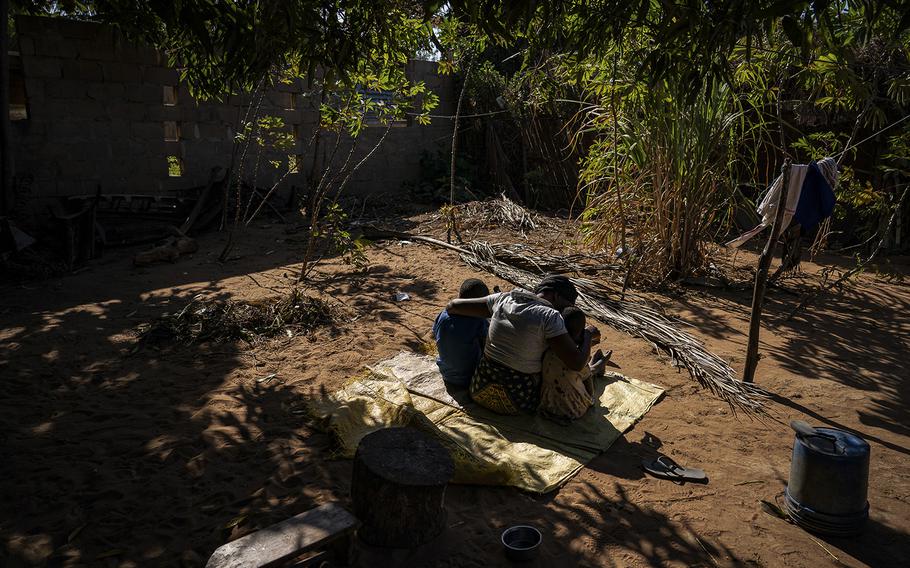
Ana sits near her home with two of her children in a village near Pemba, Mozambique, on Sept. 2, 2022. (Salwan Georges/Washington Post )
Compounding matters, the international focus on Ukraine has caused shortfalls in assistance here, as in other parts of the world. Donors have provided less than 60 percent of the $388 million sought by the United Nations this year, according to U.N. data, making it hard to help even those who have reached camps in safer areas.
"Some days, they go without food," Campira said.
When the militants overran the city of Mocímboa da Praia in 2020, they arrived at Ulenca's door. At gunpoint, they forced her and two female cousins into a car and took them to a base, where they joined other kidnapped girls and women. They were later separated and taken to other bases, she remembers.
Ulenca never saw her cousins again.
After a three-day walk, she arrived at the second base. Thirty other women were there, and it soon became clear why. Ulenca said she was handed over to a 24-year-old Tanzanian, whose nom de guerre was Fawzani. Ulenca, who was 20 at the time, was to become his "wife."
That night, when she refused to have sex, Fawzani beat her with a bamboo stick and raped her.
"All the fighters were raping the women," said Ulenca, now 22, her voice cracking. "After every rape, I prayed to God to stop my suffering and to get me back home and find my family."
She lived at the base for two years.
The fighters were mostly Mozambican, but the leaders were from Tanzania, she recalled. Many spoke Swahili, which she understood, as well as local languages. There were other foreigners, too.
Most of the fighters carried AK-47 rifles, Ulenca said. They carried out military drills every day and built deep trenches to take cover from helicopter assaults. Many fighters wore stolen Mozambican army uniforms.
"They would say 'Islam is the only religion. We want to establish an Islamic state,' " she recalled some fighters telling her.
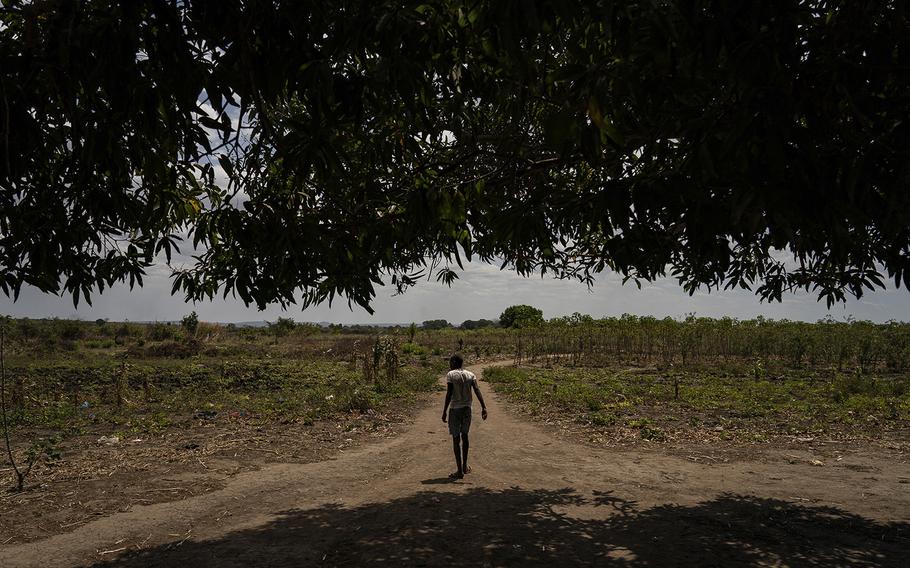
.A. walks home in a village near Pemba, Mozambique, on Sept. 2, 2022. (Salwan Georges/Washington Post )
Ulenca said she witnessed more than 10 executions, including those of several women. Some had refused to fight. Others had tried to escape. The women were shot in the back of the head. The men were beheaded.
"Everyone on the base was forced to watch," Ulenca said. "It was a lesson to others not to commit mistakes."
Two other women held at different bases said they witnessed similar atrocities.
Ana, 25, was forced to watch her husband's beheading with her two small daughters. The only reason she wasn't raped, she said, was because the fighters thought she had gone mad.
International forces may have arrested the momentum of the militants, but their brutality continues. Most people on the ground say there is no military solution to the conflict.
The United States and the European Union are spending millions to help develop Cabo Delgado - building schools and creating jobs to prevent young men from joining the militants. Under international pressure, the Mozambican government approved a reconstruction plan, tacitly acknowledging that its neglect contributed to the insurgency.
"Are the root causes of everything that has happened solved? Of course not," Pires said. "That is a huge step that we still have to fight for for a long, long time."
The victims will carry their trauma forever.
When R.A. reached the jungle base, he said, he was tied up and beaten again. His tormentors were not much older than him. Most carried guns and machetes. On the third day, by his count, as the militants took a nap, two other abducted boys loosened the ropes around their wrists and freed R.A. as well.
"As we ran, we were always looking back to see if they were chasing us," he remembered.
Ulenca escaped in May. By then, the militants had lost ground. During a bombing raid, she and another woman managed to get away. They walked for 17 hours until they reached a Mozambican army position, she said.
Ana and her girls fled in April while they went to fetch wood. Ancha, now 5, hardly remembers what happened to her dad. But Amina, who is 8, can't forget. "They killed my father," she said in a shy voice. "I still think about it when I sleep."
The Washington Post's Estacio Valoi contributed to this report.